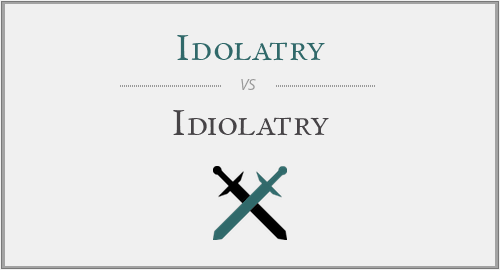
Idolatry, idiolatry, ideology.
These three words look somewhat the same. They sound somewhat the same. Do you think that these three words are similar in their meaning, as well?
Continue reading to learn the definition of these words and how they are different.
What is Idolatry?
The word idolatry is a noun and means “the worshiping of idols.” It first appeared in the English language in the 13th century.
It is derived from the Greek word eidololatria, a composite of the word eidolon (meaning image or “idol”), and the word latreia (meaning worship). It then appeared as the Latin word idololatria, idolatria, and later, as the 12th century French word idolatrie.
Idolatry is pronounced ahy-DOL-uh-tree, with the emphasis on the second syllable, DOL. Say it out loud so that you can hear the word.
Synonyms for idolatry include reverence, iconolatry, idolism, adulation, hero worship, and blind adoration.
What is Idiolatry?
The word idiolatry is a noun and means “self-worship.” It first appeared in the English language in the early 1600s.
It is derived from the Greek idio, (meaning personal, one’s own) and latry, (meaning worship).
Idiolatry is pronounced ahy-di-OL-uh-tree, with the emphasis on the third syllable, OL. Say it out loud so that you can hear how it sounds.
Synonyms for idiolatry include autolatry.
What is Ideology?
The word ideology is a noun and means “a body of beliefs and concepts held by a person, a particular group, or a political party.” It first appeared in English in the late 18th century.
It is derived from the French word ideologie, which combines the Greek idea (meaning a pattern or notion) and logia (meaning the study of). In 1796, Antoine Destutt de Tracy, a French philosopher and aristocrat, defined the word as “the science of ideas.”
Ideology is pronounced ahy-dee-OL-uh-jee, with the emphasis on the third syllable, OL. Say the word out loud to hear how it sounds.
Synonyms for ideology include credo, doctrine, dogma, creed, and philosophy.
Final Thoughts
At first glance, these three words use many of the same letters, have similar pronunciations, and seem to be somehow related. But they are not.
To summarize:
• Idolatry means idol worship.
• Idiolatry means self-worship.
• Ideology refers to a body of beliefs and concepts.
Say these words, one after another, to hear their differences and their similarities.
Idolatry, idiolatry, ideology… repeat.
Now, without looking, can you define them?








Have a discussion about this article with the community:
Report Comment
We're doing our best to make sure our content is useful, accurate and safe.
If by any chance you spot an inappropriate comment while navigating through our website please use this form to let us know, and we'll take care of it shortly.
Attachment
You need to be logged in to favorite.
Log In